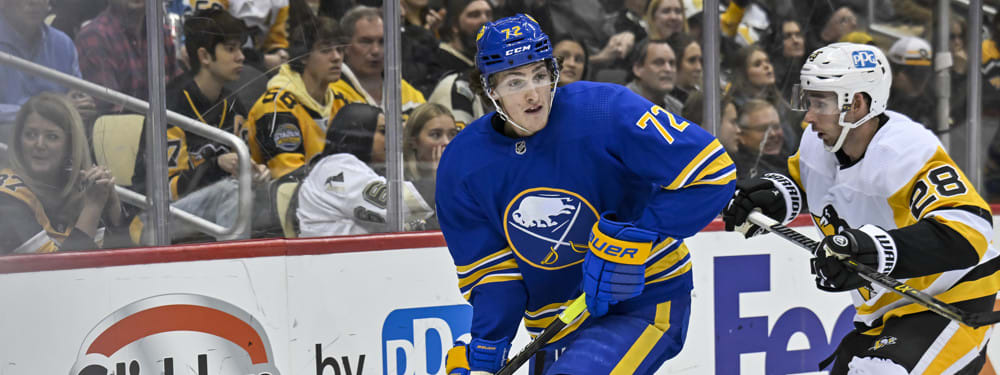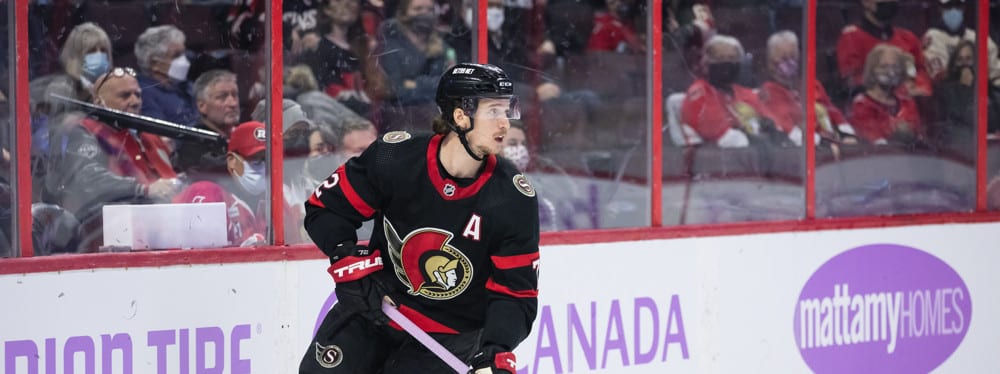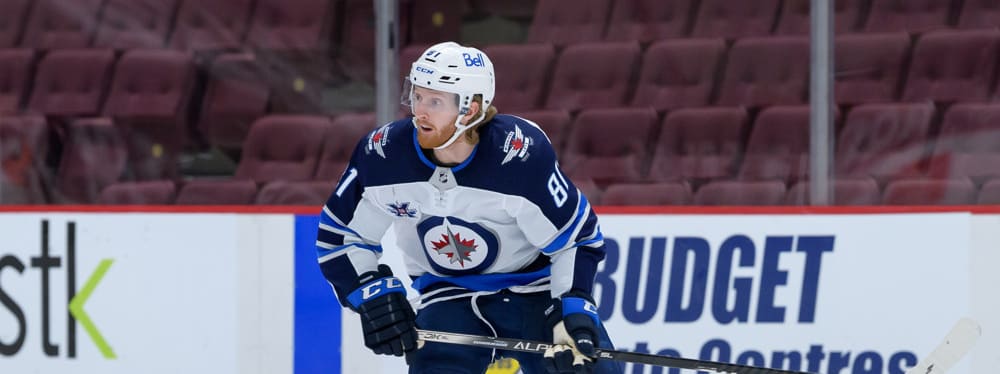Recent RotoWire Articles Featuring Thomas Greiss
See More
Playing on a Detroit team that struggled to defend, Greiss posted one of the worst seasons of his career in 2021-22. His 10-15-1 record and 3.66 GAA were both horrific, while his .891 save percentage was Greiss' lowest mark in any season in which he made at least 16 appearances. The 36-year-old signed a 1-year, $1.25 million deal with St. Louis in July. Greiss will serve as the Blues' backup behind Jordan Binnington, although he could see more playing time than originally expected given the latter's inconsistent play over the years. It's still unlikely to be enough to make Greiss an option in any fantasy format.
Moving from one of the best defensive teams in the league in the Islanders to one of the worst in Detroit, Greiss somehow saw his numbers hold steady. Yes, his 8-15-8 record was dreadful, but that was to be expected. Greiss' 2.70 GAA and .912 save percentage were both more than reasonable considering he plays for a rebuilding club. The issue for Greiss is that he figures to lose significant playing time next season to the newly acquired Alex Nedeljkovic. Detroit stole the reigning Calder Trophy finalist from Carolina in exchange for a draft pick and promptly signed him to a new three-year deal. Nedeljkovic figures to be Jeff Blashill's preferred option over the 35-year-old Greiss, who has just a single season remaining on his contract. Greiss is nothing more than a depth fantasy option for 2021-22.
Greiss came to Detroit on a two-year contract to replace the outgoing Jimmy Howard this offseason. In his last campaign with the Islanders, Greiss had a 16-9-4 record, a 2.74 GAA and a .913 save percentage in 31 games while backing up to Semyon Varlamov. The 34-year-old Greiss has had stretches of success in his career, but none more than his time with the Islanders. Joining a rebuilding team is likely to inflate his GAA and torpedo his save percentage in 2020-21. Greiss should see roughly half of the starts as he splits time with Jonathan Bernier, but it'll be tough to trust either Detroit goalie on any given night.
The 33-year-old experienced his best statistical season yet in 2018-19, posting a .927 save percentage, 2.28 GAA and five shutouts on his way to a 23-14-2 record. He split time with Robin Lehner, but Greiss was a major reason why the Islanders led the league in goals against average. While Lehner is gone, having signed a one-year deal with the Blackhawks, the Islanders added 31-year-old Semyon Varlamov on a four-year contract worth $20 million this offseason. Varlamov hasn't played a full campaign since 2013-14, so it appears as though Greiss is likely in for another timeshare in net in 2019-20. That's not a bad thing at all. Greiss has been stellar at times as the Islanders' No. 1 goaltender, but he performs better when given plenty of rest. He should receive enough of that to warrant consideration as a No. 2 fantasy netminder in deeper leagues this year.
The Islanders have parted ways with Jaroslav Halak, but that doesn't mean Greiss will be the team's primary netminder. Following a strong playoff performance in 2015, the German failed to capitalize on a chance to prove he should be the No. 1. Then the bottom fell out last season, as Greiss went 13-8-2 with a 3.82 GAA and .892 save percentage in 27 appearances, allowing Halak to re-emerge as the clear starter. Further muddying Greiss's outlook, the Islanders signed Robin Lehner -- who went 14-26-9 with a 3.01 GAA and .908 save percentage with the Sabres in 2017-18 -- to a one-year deal. Greiss and Lehner will compete for the starting role, but Christopher Gibson is also in the picture. While the hiring of legendary goalie coach Mitch Korn figures to invigorate Greiss, he's nothing more than a streaming option for fantasy owners until proven otherwise.
For two years, Greiss and Jaroslav Halak have been fighting a pitched battle for playing time in the Islanders’ net, and while Greiss seemed to be winning for much of last year, it’s far from over. The German netminder shined through the end of January, compiling a 15-7-3 record with a 2.24 GAA and .928 save mark through his first 26 games, while the Islanders waived and demote Halak to the AHL. So far, so good. However, Greiss proceeded to crash and burn under the weight of a career-high workload late in the season, as his final 25 games saw him post a 3.19 GAA and .896 save mark, culminating in Halak making a triumphant end-of-season return from the minors. In the end, Halak actually ended up besting him in the better save percentage, 915 to .913. While Greiss enters 2017-18 as the presumptive starter, it wouldn't be surprising at all to see him lose his job to Halak for stretches of time, and that lack of job security is damaging to his fantasy value.
The summer of 2015 saw Greiss rewarded with a two-year deal from the Islanders after spending the past three seasons with three different teams in the Sharks, Coyotes and Penguins. Greiss, who was expected to back up Jaroslav Halak after signing the deal, found himself in a starting role after Halak’s season ended early in March due to a groin injury. The German netminder took full advantage of the opportunity by setting career highs in wins (23) and save percentage (.925) while maintaining a highly respectable 2.36 GAA. This, coupled by his solid play in 11 playoff games, has placed a large question mark on just who will be the Islanders’ primary starting goaltender this upcoming season, especially since Halak has a history of injuries but is a very good netminder when healthy. It’s plausible that Greiss will back up Halak or be in some sort of 1A and 1B goaltending tandem (at least to start), so owners may want to consider handcuffing them together on fantasy rosters to be safe.
Greiss fits the definition of a career backup, having never played more than 25 games in a season. However, as far as backup goaltenders go, Greiss has typically provided solid work for every team he’s been on when he receives the chance to start. In 20 games with the Penguins last season, Greiss went 9-6-3 with a 2.59 GAA and a .908 save percentage, numbers that weren't remarkable, but enough to keep his squad competitive on a nightly basis. While both of those figures were actually off Greiss' career averages, they're still a significant upgrade what the Islanders received from Chad Johnson and Michal Neuvirth, Jaroslav Halak’s backups last season. With Halak entrenched as the clear-cut starter, Greiss should be viewed as a strong No. 2 and nothing else. His fantasy value ticks up if Halak goes down due to an injury, as the Islanders' strong goal-scoring efforts would put Greiss in strong position to win most of the time he takes the net.
In a somewhat surprising move, Pens GM Jim Rutherford signed Greiss to a one-year, $1 million deal over the summer. Pittsburgh's goalie situation was thought to be fairly stable with starter Marc-Andre Fleury and backup Jeff Zatkoff, but Rutherford apparently brought Greiss in to battle for at least the backup job. Playing time has always been an issue for the German-trained goalie, as he's started just 52 games in parts of five NHL seasons. Last year, Greiss played for the Coyotes, going 10-8-5 with 2.29 GAA and .920 save percentage. Training camp performance will likely dictate where the goalie begins 2014-15. Rutherford has already changed the status quo in Pittsburgh and it would not be surprising to see Greiss start 30-plus games or get sent down to AHL affiliate Wilkes-Barre.
Greiss will immediately step in as the number two netminder in Phoenix as he replaces the departed Jason LaBarbera. The former Shark, who posted a 2.15 GAA and .915 save percentage in six games with San Jose last season, is an upgrade from LaBarbera and it wouldn't be unreasonable to expect 25 starts for him.
Grumbles about Antti Niemi's 68-game workload last season mean Greiss should get 20-25 starts this year. Can he handle that? Yes ... and then some. Last season, he was 9-7 with a 2.30 goals-against average and a .915 save percentage in very limited action. Has Greiss shown us enough to prove he can be a starter? Not even close. But the talent is there and now the opportunity will increase; he'll be looking to earn a raise on his current contract. There's a lot of motivation in that. Be sure to handcuff him to Niemi, particularly in daily formats.
Greiss is a talented goalie prospect trying to make a name for himself in the Bay Area. Early in the 2010 offseason, he had been the supposed backup to Antero Niittymaki, but the Sharks ended up signing Antti Niemi, consequently leaving Greiss without an NHL job. Greiss then headed to the Swedish Elite League, where he posted a 2.92 goals-against average and .901 save percentage in 32 games with Brynas IF. The Sharks re-signed the German backstop to a two-year contract, but with the aforementioned goalies still in San Jose, Greiss will remain little more than a depth option between the pipes for Team Teal.
Greiss served as the backup to Evgeni Nabokov in the 2009-10 regular season. In doing so, the German puck-stopper was between the pipes for 16 games, posting a 2.68 goals-against average and a 7-4-1 record. But Nabokov is no longer in the NHL, opening the door for Greiss to step into a larger role. Yes, the Sharks did pick up netminder Antero Niittymaki in the offseason to add stability in goal, but he's not likely to hog as many starts from Greiss as Nabokov did. Greiss would become worthy of starts in most fantasy leagues in the event that Niitymaki struggles, or gets injured.
Greiss was drafted by San Jose in the third round (94th overall) of the 2004 entry draft. The German has ideal size and strength, and has been polishing his game with Worcester of the AHL since the 2006-07 season. Now that Brian Boucher is no longer in town to back up Evgeni Nabokov, Greiss will be begin the 2009-10 season second in the pecking order among Sharks goalies.
Depth at goaltender is a luxury the Sharks should enjoy for years to come. Nested in their minor league system is Greiss, a young goalie who demonstrates outstanding positioning in order to predict an offense before ultimately stopping the puck. In 2007-08, Greiss won 18 games and lost 21 for the Worcester Sharks with a 3.09 goal against average. Evgeni Nabokov is arguably the best goalie in hockey, so Greiss has ample time to grow with a great mentor to learn from. He’s knocking on the NHL door as the Sharks' "goalie of the future," but won’t log much time this season barring injury to Nabokov or Brian Boucher.
The one consistency for the San Jose Sharks has been being able to develop NHL goaltenders. Out of the four goaltenders that are currently in the NHL, two of them have starting jobs: Mikka Kiprusoff and Evgeni Nabokov. And the other two are competing for a starting spot: Vesa Toskala and Johan Hedberg. Greiss enters training camp as the number two option for the Sharks. His playing time will be limited.








